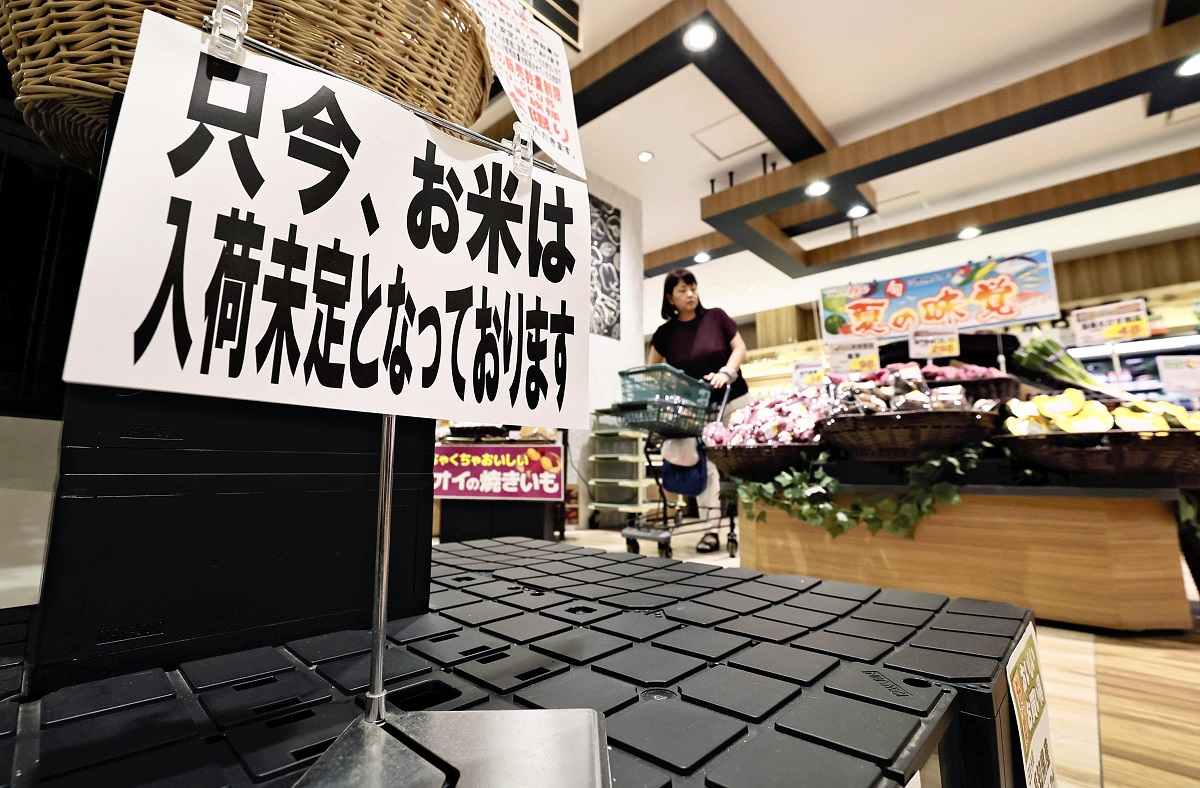Japan Consumers Fret Over Limited Supplies of Rice; Inventories Fall Due to Poor Quality, Increased Tourism

A sign at a supermarket in Abeno Ward, Osaka, on Tuesday says it is unclear when new shipments of rice will be delivered.
20:00 JST, August 28, 2024
Rice continues to be in short supply at supermarkets and other retail outlets across the nation, partly due to lower quality caused by last year’s extremely hot summer weather and an increase in tourists from overseas.
The government is calling on consumers to make calm buying decisions, as the shortfalls are expected to be resolved when this year’s rice harvests reach the market in September.
1 bag per family
A notice at a supermarket in Tokyo on Tuesday morning said that rice was limited to one bag per family. “We ask customers to cooperate with this restriction on purchases, so that as many people as possible can buy [rice],” the notice said.
However, the shelves were already empty.
A supermarket in Abeno Ward, Osaka, procured 30 bags containing five kilograms each of rice on Tuesday morning. They sold out in about 30 minutes.
Ito-Yokado Co. currently limits purchases at all of its stores. Aeon Co. does not observe the same limits throughout its chain, as supply-demand conditions differ around the nation, but some Aeon group supermarkets are restricting purchases.
“Inventories are certainly decreasing,” an official at a major retail company said.
According to the Agriculture, Forestry and Fisheries Ministry, the private sector had an inventory of 1.56 million tons of rice at the end of June, down 410,000 tons from a year before. This was the lowest figure since 1999, when comparable data became available.
Preparing for disaster
The short supply of rice is partly due to the extremely hot weather last year. Very high temperatures continued as the rice ears began to emerge, so rice grains became cloudy or were broken, resulting in low quality. The amount sent to market therefore declined.
According to the ministry, 60.9% of the rice grains harvested in 2023 were first-grade as of the end of March. This was nearly 20 percentage points lower than a year before.
The prices of many foodstuffs have continued rising, but rice prices rose at a slow pace and demand for dining out has risen due to a rapid increase in inbound foreign tourists after the easing of the COVID-19 crisis. This too has contributed to the short supply.
There has also been excessive stockpiling of rice in preparation for future disasters.
August is usually the period between seasons, before new harvests of rice enter the market. Thus, inventory falls to the lowest level of the year.
On Aug. 8, a temporary alert about a possible megaquake along the Nankai Trough was announced, and typhoons have approached Japan one after another recently. Many households increased their stocks of rice as a result.
Rice prices have been climbing as supply dwindled. The average wholesale price of all rice brands harvested in 2023 was ¥15,865 per 60 kilograms in June. This was the highest level in the past 10 years.
The wholesale price remained high in July at ¥15,626, up 13% from a year before.
New harvests
However, there are signs that relief is at hand. Early harvests of rice, including grains from Miyazaki Prefecture, have begun at some supermarkets.
In September, new harvests will enter the market from such prefectures as Chiba and Ibaraki. About 40% of annual shipments are expected to begin circulating in the month.
“The rice to be harvested in 2024 has grown well. There are production sites where harvesting will begin about a week earlier than usual, so shipments are also expected to begin earlier,” Agriculture, Forestry and Fisheries Minister Tetsushi Sakamoto said at a press conference after a Cabinet meeting on Tuesday.
Sakamoto indicated that the rice supply is expected to gradually recover, and also revealed that he had asked five major rice wholesalers on Monday to collect and sell rice smoothly.
However, even if the supply-demand situation improves, it is uncertain whether rice prices will quickly fall.
A rice wholesaler in the Kyushu region said that wholesale prices for 2024 harvests have been more than 50% above those last year.
“Prices are sure to continue to be higher,” the wholesaler said.
Top Articles in Business
-

Prudential Life Insurance Plans to Fully Compensate for Damages Caused by Fraudulent Actions Without Waiting for Third-Party Committee Review
-

Narita Airport, Startup in Japan Demonstrate Machine to Compress Clothes for Tourists to Prevent People from Abandoning Suitcases
-

Japan, U.S. Name 3 Inaugural Investment Projects; Reached Agreement After Considerable Difficulty
-

Toyota Motor Group Firm to Sell Clean Energy Greenhouses for Strawberries
-

SoftBank Launches AI Service for Call Centers That Converts Harsh Customer Voices into Softer Voices
JN ACCESS RANKING
-

Japan PM Takaichi’s Cabinet Resigns en Masse
-

Japan Institute to Use Domestic Commercial Optical Lattice Clock to Set Japan Standard Time
-

Israeli Ambassador to Japan Speaks about Japan’s Role in the Reconstruction of Gaza
-

Man Infected with Measles Reportedly Dined at Restaurant in Tokyo Station
-

Videos Plagiarized, Reposted with False Subtitles Claiming ‘Ryukyu Belongs to China’; Anti-China False Information Also Posted in Japan





















